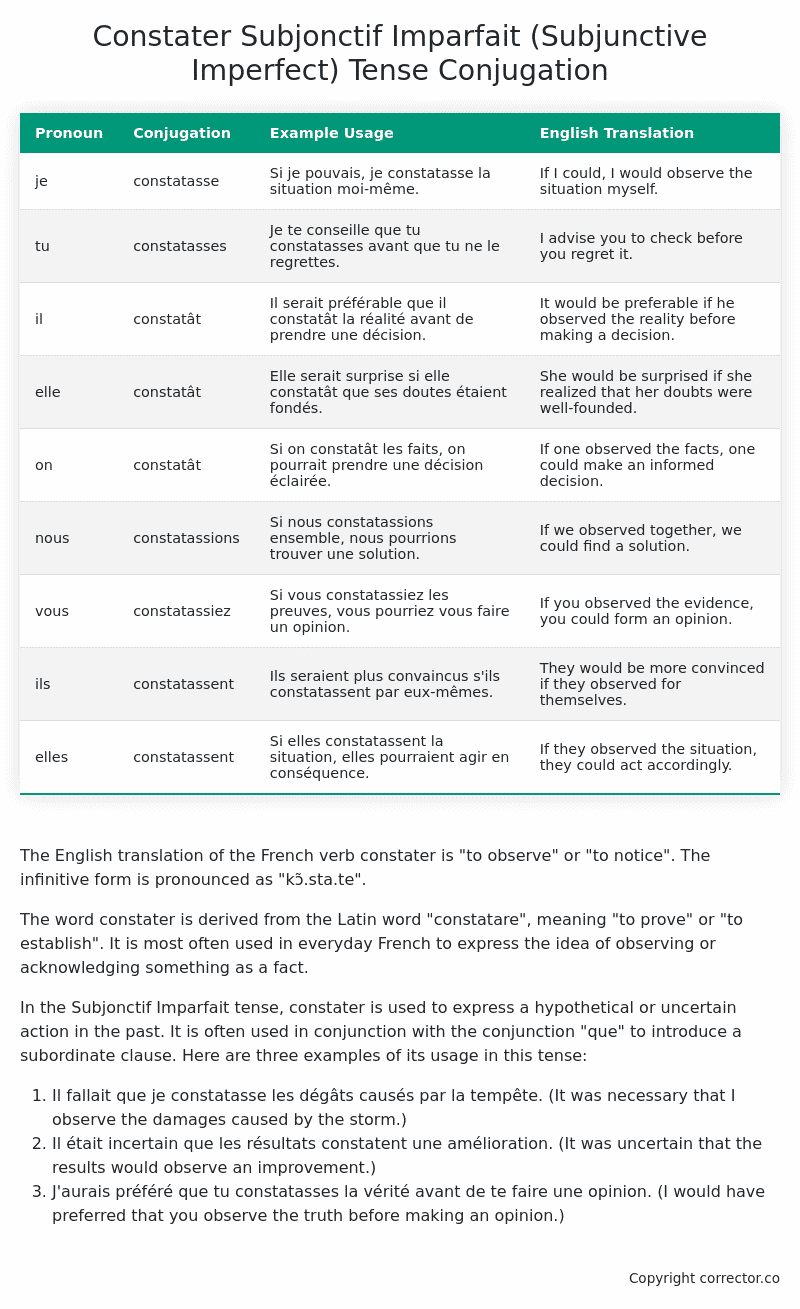Subjonctif Imparfait (Subjunctive Imperfect) Tense Conjugation of the French Verb constater
Introduction to the verb constater
The English translation of the French verb constater is “to observe” or “to notice”. The infinitive form is pronounced as “kɔ̃.sta.te”.
The word constater is derived from the Latin word “constatare”, meaning “to prove” or “to establish”. It is most often used in everyday French to express the idea of observing or acknowledging something as a fact.
In the Subjonctif Imparfait tense, constater is used to express a hypothetical or uncertain action in the past. It is often used in conjunction with the conjunction “que” to introduce a subordinate clause. Here are three examples of its usage in this tense:
- Il fallait que je constatasse les dégâts causés par la tempête. (It was necessary that I observe the damages caused by the storm.)
- Il était incertain que les résultats constatent une amélioration. (It was uncertain that the results would observe an improvement.)
- J’aurais préféré que tu constatasses la vérité avant de te faire une opinion. (I would have preferred that you observe the truth before making an opinion.)
Table of the Subjonctif Imparfait (Subjunctive Imperfect) Tense Conjugation of constater
| Pronoun | Conjugation | Example Usage | English Translation |
|---|---|---|---|
| je | constatasse | Si je pouvais, je constatasse la situation moi-même. | If I could, I would observe the situation myself. |
| tu | constatasses | Je te conseille que tu constatasses avant que tu ne le regrettes. | I advise you to check before you regret it. |
| il | constatât | Il serait préférable que il constatât la réalité avant de prendre une décision. | It would be preferable if he observed the reality before making a decision. |
| elle | constatât | Elle serait surprise si elle constatât que ses doutes étaient fondés. | She would be surprised if she realized that her doubts were well-founded. |
| on | constatât | Si on constatât les faits, on pourrait prendre une décision éclairée. | If one observed the facts, one could make an informed decision. |
| nous | constatassions | Si nous constatassions ensemble, nous pourrions trouver une solution. | If we observed together, we could find a solution. |
| vous | constatassiez | Si vous constatassiez les preuves, vous pourriez vous faire un opinion. | If you observed the evidence, you could form an opinion. |
| ils | constatassent | Ils seraient plus convaincus s’ils constatassent par eux-mêmes. | They would be more convinced if they observed for themselves. |
| elles | constatassent | Si elles constatassent la situation, elles pourraient agir en conséquence. | If they observed the situation, they could act accordingly. |
Other Conjugations for Constater.
Le Present (Present Tense) Conjugation of the French Verb constater
Imparfait (Imperfect) Tense Conjugation of the French Verb constater
Passé Simple (Simple Past) Tense Conjugation of the French Verb constater
Passé Composé (Present Perfect) Tense Conjugation of the French Verb constater
Futur Simple (Simple Future) Tense Conjugation of the French Verb constater
Futur Proche (Near Future) Tense Conjugation of the French Verb constater
Plus-que-parfait (Pluperfect) Tense Conjugation of the French Verb constater
Passé Antérieur (Past Anterior) Tense Conjugation of the French Verb constater
Futur Antérieur (Future Anterior) Tense Conjugation of the French Verb constater
Subjonctif Présent (Subjunctive Present) Tense Conjugation of the French Verb constater
Subjonctif Passé (Subjunctive Past) Tense Conjugation of the French Verb constater
Subjonctif Imparfait (Subjunctive Imperfect) Tense Conjugation of the French Verb constater (this article)
Subjonctif Plus-que-parfait (Subjunctive Pluperfect) Tense Conjugation of the French Verb constater
Conditionnel Présent (Conditional Present) Tense Conjugation of the French Verb constater
Conditionnel Passé (Conditional Past) Tense Conjugation of the French Verb constater
L’impératif Présent (Imperative Present) Tense Conjugation of the French Verb constater
L’infinitif Présent (Infinitive Present) Tense Conjugation of the French Verb constater
Struggling with French verbs or the language in general? Why not use our free French Grammar Checker – no registration required!
Get a FREE Download Study Sheet of this Conjugation 🔥
Simply right click the image below, click “save image” and get your free reference for the constater Subjonctif Imparfait tense conjugation!

Constater – About the French Subjonctif Imparfait (Subjunctive Imperfect) Tense
Formation
Common Everyday Usage Patterns
Interactions with Other Tenses
Subjonctif Présent
Indicatif Passé Composé
Conditional
Conditional Perfect
Summary
I hope you enjoyed this article on the verb constater. Still in a learning mood? Check out another TOTALLY random French verb conjugation!


